Related Research Articles
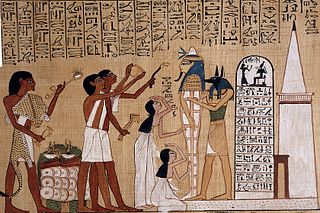
A funeral is a ceremony connected with the final disposition of a corpse, such as a burial or cremation, with the attendant observances. Funerary customs comprise the complex of beliefs and practices used by a culture to remember and respect the dead, from interment, to various monuments, prayers, and rituals undertaken in their honor. Customs vary between cultures and religious groups. Funerals have both normative and legal components. Common secular motivations for funerals include mourning the deceased, celebrating their life, and offering support and sympathy to the bereaved; additionally, funerals may have religious aspects that are intended to help the soul of the deceased reach the afterlife, resurrection or reincarnation.

Johannes Rau was a German politician (SPD). He was the president of Germany from 1 July 1999 until 30 June 2004 and the minister president of North Rhine-Westphalia from 20 September 1978 to 9 June 1998. In the latter role, he also served as president of the Bundesrat in 1982/83 and in 1994/95.

Helmut Josef Michael Kohl was a German politician who served as Chancellor of Germany from 1982 to 1998 and Leader of the Christian Democratic Union (CDU) from 1973 to 1998. Kohl's 16-year tenure is the longest of any German chancellor since Otto von Bismarck, and oversaw the end of the Cold War, the German reunification and the creation of the European Union (EU). Furthermore, Kohl's 16 years and 30 day tenure is the longest for any democratically elected chancellor of Germany.
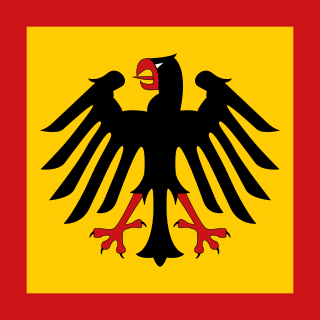
The president of Germany, officially the Federal President of the Federal Republic of Germany, is the head of state of Germany.

Mourning is the expression of an experience that is the consequence of an event in life involving loss, causing grief, occurring as a result of someone's death, specifically someone who was loved although loss from death is not exclusively the cause of all experience of grief.
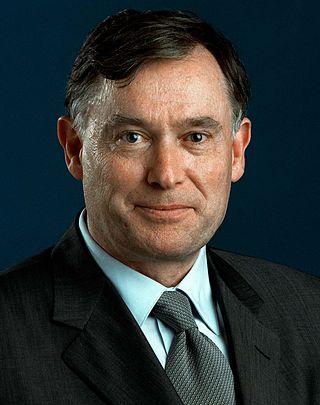
Horst Köhler is a German politician who served as President of Germany from 2004 to 2010. As the candidate of the two Christian Democratic sister parties, the CDU and the CSU, as well as the liberal FDP, Köhler was elected to his first five-year term by the Federal Convention on 23 May 2004 and was subsequently inaugurated on 1 July 2004. He was reelected to a second term on 23 May 2009. Just a year later, on 31 May 2010, he resigned from his office in a controversy over a comment on the role of the German Bundeswehr in light of a visit to the troops in Afghanistan. During his tenure as president, whose office is mostly concerned with ceremonial matters, Köhler was a highly popular politician, with approval rates above those of both Chancellor Gerhard Schröder and later Chancellor Angela Merkel.

A eulogy is a speech or writing in praise of a person or persons, especially one who recently died or retired, or as a term of endearment.

A state visit is a formal visit by a head of state to a foreign country, at the invitation of the head of state of that foreign country, with the latter also acting as the official host for the duration of the state visit. Speaking for the host, it is generally called a state reception. State visits are considered to be the highest expression of friendly bilateral relations between two sovereign states, and are in general characterised by an emphasis on official public ceremonies.

Richard Karl Freiherr von Weizsäcker was a German politician (CDU), who served as President of Germany from 1984 to 1994. Born into the aristocratic Weizsäcker family, who were part of the German nobility, he took his first public offices in the Evangelical Church in Germany.
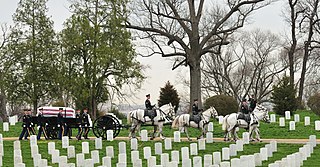
A military funeral is a memorial or burial rite given by a country's military for a soldier, sailor, marine or airman who died in battle, a veteran, or other prominent military figures or heads of state. A military funeral may feature guards of honor, the firing of volley shots as a salute, drumming and other military elements, with a flag draping over the coffin.
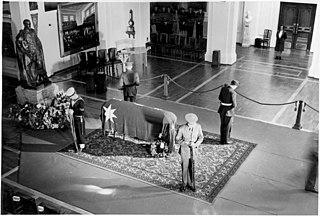
A state funeral is a public funeral ceremony, observing the strict rules of protocol, held to honour people of national significance. State funerals usually include much pomp and ceremony as well as religious overtones and distinctive elements of military tradition. Generally, state funerals are held in order to involve the general public in a national day of mourning after the family of the deceased gives consent. A state funeral will often generate mass publicity from both national and global media outlets.

The United States Marine Band is the premier band of the United States Marine Corps. Established by act of Congress on July 11, 1798, it is the oldest of the United States military bands and the oldest professional musical organization in the United States. Today, the Marine Band includes the Marine Chamber Orchestra and Marine Chamber Ensembles.
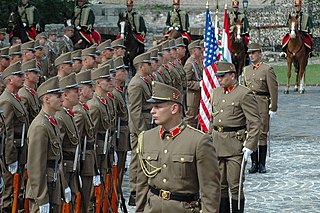
A guard of honour (GB), also honor guard (US), also ceremonial guard, is a group of people, usually military in nature, appointed to receive or guard a head of state or other dignitaries, the fallen in war, or to attend at state ceremonials, especially funerals. In military weddings, especially those of commissioned officers, a guard, composed usually of service members of the same branch, form the Saber arch. In principle, any military unit could act as a guard of honour. However, in some countries certain units are specially designated to serve as a guard of honour, as well as other public duties.

The Großer Zapfenstreich is a military ceremony performed in Germany and Austria. It is similar to the military tattoo ceremony performed in English-speaking countries, and is the most important ceremonial act executed by the German federal armed forces, the Bundeswehr, and by the Austrian federal armed forces Bundesheer. The Zapfenstreich is performed only during national celebrations and solemn public commemorations, to honour distinguished persons present at such special events. Examples are the farewell ceremony for a German federal president, or at the conclusion of large military exercises. It takes place in the evening hours and consists of a military formation of at least one military band, two platoons of armed infantrymen, and two lines of soldiers carrying torches, in total about 400 men.

A signing ceremony is a ceremony in which a document of importance is signed (approved). Typically the document is a bill passed by a legislature, thus becoming a law by an executive's signature. However, the document may also be, for example, an executive order, international agreement, or a veto statement that invalidates a legislative measure.
A funeral procession is a procession, usually in motor vehicles or by foot, from a funeral home or place of worship to the cemetery or crematorium. In earlier times the deceased was typically carried by male family members on a bier or in a coffin to the final resting place. This practice has shifted over time toward transporting the deceased in a hearse, while family and friends follow in their vehicles. The transition from the procession by foot to procession by car can be attributed to two main factors; the switch to burying or cremating the body at locations far from the funeral site and the introduction of motorized vehicles and public transportation making processions by foot through the street no longer practical.

The European act of state in honour of Helmut Kohl was an act of state to honour former German Chancellor Helmut Kohl following his death, and took place at the European Parliament in Strasbourg, France on 1 July 2017 from 11 AM to 1 PM. It was announced by the European Commission on 18 June 2017, and was the first European act of state in the history of the European Union. It was co-organised by the European Commission, the European Parliament and the European Council.

Helmut Kohl, the former Chancellor of Germany, died on the morning of Friday, 16 June 2017 in the Oggersheim district of Ludwigshafen, his home town, aged 87. In office from 1982 to 1998, he is widely regarded as the "father of the German reunification" and as a principal architect of the Maastricht Treaty which established the European Union (EU) and the euro currency. In 1998 he became the second person to be named an Honorary Citizen of Europe. Following his death, he was lauded by world leaders as "the greatest European leader of the second half of the 20th century" and was honoured with an unprecedented European Act of State in his honour in Strasbourg, France, attended by the leaders of the EU's nations and other current and former world leaders. Subsequently, a Catholic requiem mass was celebrated in the Speyer Cathedral in Speyer, Germany, after which Kohl was interred in the nearby Old Cemetery.
In Korea, the marking of traditional milestones in life is known as The Four Ceremonial Occasions, or Gwanhonsangje. The four rites of passage celebrated in this tradition are the coming of age, marriage, death, or the funeral rites, and rites venerating the ancestors. The word Gwanhonsangje is a generic term made up of the first letter of each word.